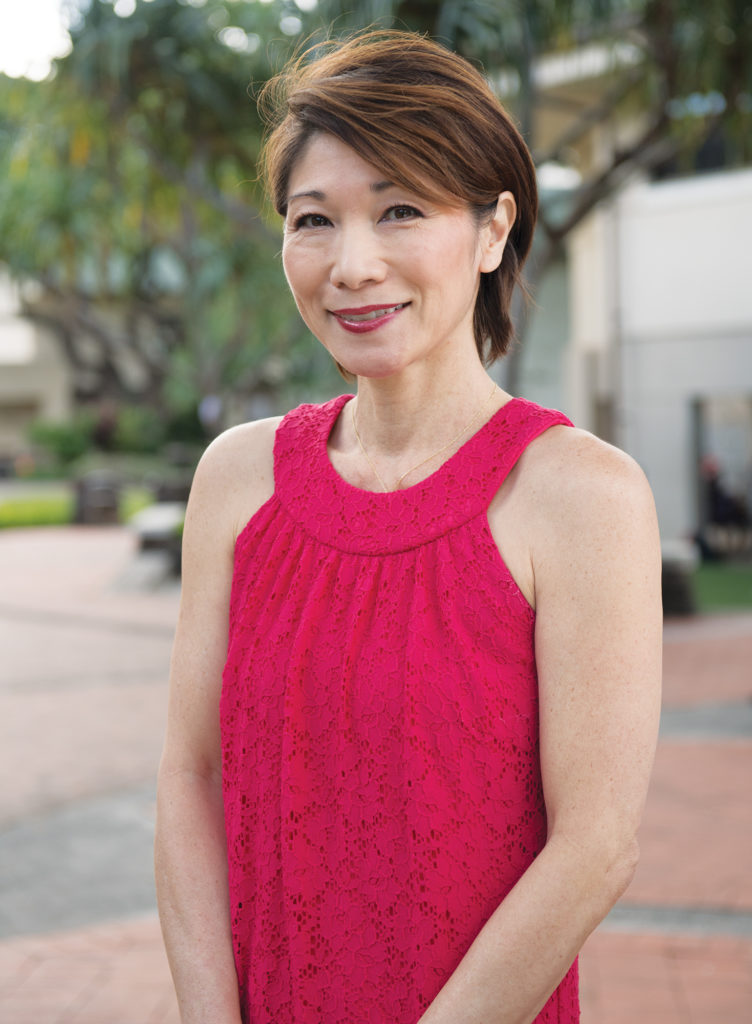
During the 2016 – 2017 school year, a new position for an Institutional Researcher was established to help better understand the School’s current practices. In the Western Association of Schools and Colleges (WASC) 2015 – 2016 Accreditation Self Study Report, the role was identified as an area of opportunity to further collect, interpret, synthesize and use meaningful data to enhance understanding and inform decision-making.
Institutional Researcher Denise Uehara came to Punahou most recently from the Center on Disability Studies at the College of Education at University of Hawai‘i – Manoa where she was a principal investigator and evaluator. Uehara holds a bachelor’s degree in psychology, a master’s degree in education counseling and guidance, a doctorate of philosophy in education, and a graduate certificate in disability and diversity studies.
What is an Institutional Researcher?
There are so many opportunities in this job that it’s hard to define. Typically, these positions are found in higher education and have a focus on enrollment, retention and graduation, using data as a source for effective planning and decision-making.
What are your primary responsibilities?
Essentially, I see the Punahou Institutional Researcher supporting faculty and staff who want to do research, and as a change agent to the larger community where information is thoughtfully collected and used to make decisions about fulfilling the mission, vision and aims of Punahou School.
Because Punahou is such a large, diverse and continuously evolving institution, it may be perceived as a “laboratory” for internal and external audiences. To protect our interests, I have developed research protocols for faculty interested in doing research and for others outside of the school, such as university students who want to collect information for their projects. Research in schools is not easy, especially because it deals with human subjects and protections need to be in place. We now have a process that serves as a review for anyone who wants to do research here at the School.
Why does Punahou need an Institutional Researcher?
Punahou has done a great job at collecting data across campus. The need comes in figuring out where all of the data is stored, for what length of time, how to access this information and make use of it in a way that is digestible for different audiences. Once the data is mined, analyzed and interpreted, folks have an opportunity to do something with that information.
Were you always interested in research?
My passion for research was sparked as a result of my master’s degree studies working with my advisor on a counseling intervention, and I enjoyed the research aspect of the project. My love for research was fueled while working at an educational “R&D” organization where I worked with schools and school systems across Hawai‘i and the Pacific, evaluating new programs and studying innovative practices. These experiences of collecting, analyzing and interpreting data in different environments – geographic, political and social – shaped how I approach my work.
What do you enjoy most about this role?
Everything! I am so happy to be back in a K – 12 setting where the big picture is always in mind, and student and teacher well-being, learning environments and 21st-century skills are priorities.
How do you collect data?
I use secondary sources – data that already exists such as student grades, test scores, admissions and attendance records – and primary sources such as formal questionnaires, interviews and observations. An important responsibility of data collection is to follow guidelines and standards of confidentiality.
Are you collecting data from students?
Yes, I am able to do some data mining of student information such as standardized test scores, courses taken, grades and extra-curricular participation. And, I just completed a voluntary pilot of a social emotional learning measure across campus. This pilot allows us to look at the available measures of the “soft” skills reflected in the Aims of a Punahou Education. Privacy and confidentiality of data collected is of great importance and we have processes in place so that information about individuals is not shared in the reporting of analyzed data.
Do you have opportunities to support student work?
Yes! That is one of the best parts of my job. I am available to support our students wanting to do social science research. As part of a new Academy course last semester, I had the privilege of co-teaching a section on research for gender studies. It’s been such a wonderful experience being in the classroom again, working with students on a regular basis. Not only does it give me a context for the research that I do, but also it keeps me grounded in considering all aspects of educational inquiry.
How do you support faculty?
Faculty here are such masters of their craft, it seems natural that they would want to dive deeper into their own learning to better understand students and ways to further hone their skills. I get to be a part of their inquiries by helping them ask questions around student learning, develop tools and instruments to measure outcomes, and examine data sets that can result in tangible changes.
What are some examples of projects you’ve worked on?
I’ve been involved in coordinating a campus-wide data collection effort ranging from admissions and advancement to facilities and athletics information. I have also worked with several different campus groups (Middle School Social Studies, Academy Camp staff, Archives, etc.) to assess curricula, obtain feedback or develop processes that align with best practices. I look forward to implementing more projects that collect standard information in a formalized way, such as ethnicity data. This type of information will allow for an even better understanding of our campus community.
